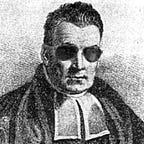In the model, only the creator is conscious
In the physical world, identity is tricky, “self” is illusory and the subject-object distinction is not what it appears. There is something closely related to the idea of the “self” that both helps explain why our naive conception of the “self” as something aloof from the objective world is so compelling and also potentially solves the “hard problem” of consciousness.
The key fact to notice is that the “self” has a special property — it is the representation, in the model, of the model maker. It is this recursive relationship that causes us to experience the “self” differently from how we experience everything else.
— -
Our experiences are not directly in contact with the physical world. When I look at a rose, there is no way for the light reflected off of the rose to enter my skull. Even if it could penetrate my skull, there is still no way for the light from the rose to come into direct contact with my “self.” As a matter of fact, my “self” does not even exist in the same world that the rose exists in. The rose and my brain both exist in the physical world. My brain is constructing a model of the physical world. This model contains a representation of the rose, and this representation is the thing that is “red”.
Likewise, my “self” is an object being represented in the model. I can notice that I am hungry, or have a pain somewhere, or an emotion, or whatever. All of this, the self, the rose, the hunger, and everything that I experience is something instantiated in the model. There is a “physical” world out there somewhere, but that is not the world “I” experience. The only world I perceive is this dream that my brain is constructing.
The next thing to notice is that this model of the world feels real in a very thorough way. You might not imagine a toy submarine to have any reality to it apart from the plastic it is constituted of. But somehow the model we inhabit is very, very real to us. To me this is a strong argument that the universe is, at bottom, only an eternal mathematical object, and that mathematical objects feel and indeed ARE quite real in every possible way to the observers who are instantiated by them — because the model is where they reside and what they are constituted of.
The unsettling consequence of this line of thought is that “you” and “I” do not inhabit the same world. You inhabit your dream. I inhabit my dream. When I wish to communicate with you, my brain activates motor neurons which send a signal via the physical world to your physical body, and this is interpreted by your brain and shows up (with a slight lag) as a representation in your dream.
Imagine if there were in fact 8 billion different planets, orbiting 8 billion different stars, existing in 8 billion different copies of our universe, but all of which were kept synchronized by some massive communication system. Each of these 8 billion universes has only one conscious inhabitant, and all of the other inhabitants of the planet are unconscious robotic avatars. If I cut into my arm I will see blood. But if I cut into the arm of literally any other being on the planet I will see only wires and stuffing. Would it be wrong to harm one of these robots? Here is the catch. Far away from me, on another planet, where the living version of the person lives, a robotic avatar representing me and wielding the knife in the exact same way I do, will actually cut into their flesh and blood.
This is a strange thought experiment, but this is really like the situation that we find ourselves in. The world you live in, the only world you will ever know, literally only contains a single inhabitant who is capable of perceiving anything at all belonging to that world. Just you. That is the root of the asymmetry that makes us perceive the “self” as special and aloof from the world. On your planet, there really is something important which makes you different from everyone else on the planet. It is your special relationship with the world. Your brain is the one instantiating the world, and you are the only person who lives in the world and can perceive the world. The rest of the inhabitants of the world are avatars you have constructed to represent people who live elsewhere.
This is also why you cannot measure the consciousness of any other thing in the world, yet you are very aware of your own consciousness. Your perception is literally the only perception happening in the world your brain is constructing, and your representation of your mental state has exactly the same ontological status as your representation of a piece of chocolate cake that you are about to eat.
